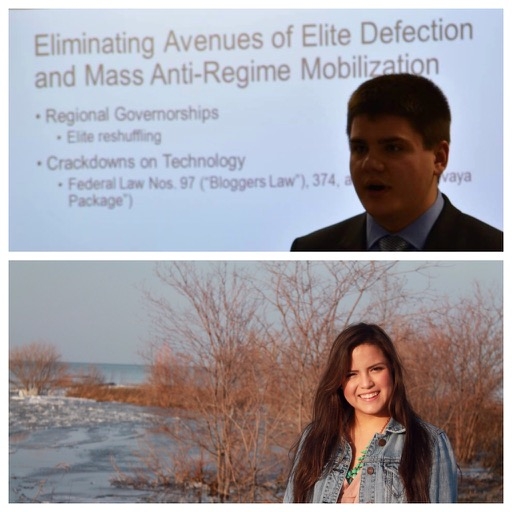News
Hecht and Paniagua-Pardo Win PLS/IR Outstanding Paper Award
April 09, 2018

Bryce Hecht's paper, "'All Autocratic Regimes Come to an End?' Explaining Regime Stability in Russia" and Estefany Paniagua-Pardo's paper, "Content Analysis: New York Times Coverage of Immigration during the Trump Presidency" were both selected by the PLS/IR Student Awards Committee as the Political Science and International Relations Outstanding Papers written for a PLS/IR course in 2017. Bryce wrote his research paper last fall while taking PLS 339 Democracy and the Authoritarian Challenge. Estefany wrote her paper in the fall for PLS 340 Mass Media and American Politics. There were a total of ten submissions, and Bryce and Estefany each will receive a $100 monetary award. Thanks to those students who submitted their papers for consideration, and congratulations, Bryce and Estefany!
Here is the abstract to Bryce's excellent paper:
Since his return to the presidency in 2012, Russian President Vladimir Putin has governed amidst poor economic conditions. While recent research suggests that these conditions often precipitate a decrease in mass support and an increase in the odds that elite defections will occur, Putin’s regime has remained intact. In this paper, I aim to provide an explanation for this phenomenon. I argue that in response to these conditions, the regime has taken new steps to legitimize itself and, in turn, build popular support and prevent elite defections. First, aided by popular domestic media outlets, it has cast the blame for Russian’s economic situation on sanctions levied by Western governments in response to the country’s 2014 annexation of Ukraine’s Crimean territory, resulting in the proliferation of anti-Western sentiment. Second, and again aided by several media outlets, it has framed Putin as a protective barrier against these external forces, resulting in an increase in his own approval rating. In light of this popular sentiment, the regime has weakened key venues of elite defection and mass anti-regime mobilization, namely the country’s regional governorships and independent technology platforms, thus rendering elites unable to defect.
Here is the abstract to Estefany's excellent paper:
This paper investigates New York Times coverage of immigration during the early months of the Trump presidency. In so doing, it contributes to the already existing conversation and evaluation of the Trump administration by identifying prominent narratives promoted by the media. Using the time period beginning on January 20, 2017 to April 14, 2017, six to seven news articles were selected from all three sampling months that focused strictly on immigration and Trump (n=20). During the time frame, every other story found in the New York Times database was sampled. Each individual paragraph was examined as the unit of analysis to generate a reasonable number of data points for the study (n=529). Based on the findings from the analysis of the media’s coverage of immigration during the Trump presidency, a strong conclusion can be drawn -- Trump’s media coverage of immigration is both negative and provocative. Unlike previous research from the early months of Trump’s presidency which has sought to evaluate Trump’s overall presidency, this paper specifically investigates immigration and provides a number of important insights, especially about the media’s assessment and the public's reaction to Trump’s major immigration policy shifts via executive orders, agency memoranda, and changes to existing programs.

